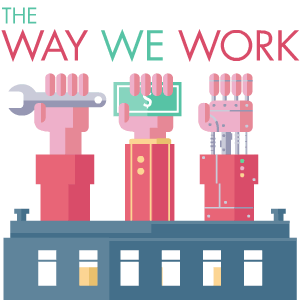

Writing for Forbes last December, Cameron Keng argued that if Apple were a co-operative, each of its employees–from mine to production line, in-store genius to CEO–would have earned a $403,000 share of its profits in 2014, on top of one’s salary. But Apple is neither jointly-owned, nor democratically-controlled, by its workers. Nor are the vast majority of digital companies starting-up today.
Companies like online shoe retailer Zappos, now owned by Amazon, have famously adopted holocratic principles that encourage a flatter structure and abolish job titles, but that greater equality ends at wages and stock options. While Zappos looks a far cry from the rigid hierarchy seen at Apple, its approach appears more as a socialization of efforts and privatization of profit, hardly opening up the business for the benefit of all its workers.
“The Internet is built upon global cooperation and collaboration often with people you don’t even know,” said Rhiannon Colvin, founder of AltGen, which helps young people combat youth unemployment and precarious work by setting up their own co-ops. “There is a lot of synergy between the values of the open-source movement and the co-operative movement, but it has yet to be capitalized on.”
She added: “Imagine if new digital and tech inventions such as Facebook or Uber were owned by the people that actually create the wealth–the users of Facebook that generate the content and all the taxi drivers that work with Uber. Of course, there would still be paid staff to run it and innovate, but the shares and growth of the business would be making everyday people richer, not already-wealthy investors.”
In just such a move, Marcos Menendez launched the TheGoodData co-op to see if he could help combat growing issues about data ownership by ensuring that “users are part of the solution.” But he’s only too familiar with the challenges that co-ops can bring. Global finance systems are not built for them, and there isn’t yet an out-of-the-box solution for setting one up anywhere in the world. There are also questions over whether co-ops can work at scale and, in an increasingly unequal society, how to garner the necessary first-stage startup costs.
La’Zooz, a ridesharing platform launched in late 2014 that offers users community-based tokens for shared journeys, is attempting to get around this complexity by operating without any ownership. “It has governance principles and tools, but has no legal basis,” Menendez explained. “Its members couldn’t set up an office, but they can work together to try and oust Uber and Lyft.”
One of the key things a co-op model could offer tech is a re-engagement with its supply chains and a more holistic approach to tech production. Catherine Williams is a director (alongside all of her colleagues) at workers’ co-op Unicorn, a food store based in Manchester, U.K. “Regardless of a member’s primary role, everyone has shop-floor time, whether it’s on the till, managing the store, making soup at the deli or packing commodities on our production site,” she said. “In food, we talk a lot about the farmers, the people doing the hard work in the fields. In tech, nobody really talks about the factory workers, working long hours, or the children out in illegal mines foraging for tin.”
The collaborative message does seem to be hitting home with some unlikely characters at the top of the tech industry. Fred Wilson, a venture capitalist with Union Square Ventures in New York City, has started engaging in online conversations with his peers about community ownership of tech companies. “With more and more web and mobile applications deriving their value mostly or completely from their user base (Facebook, Twitter, eBay, Etsy, Reddit, Kickstarter, Uber, etc), there is a growing sense that the community could or should have some real ownership in these businesses,” he wrote in January.
Some policymakers are also taking note. A $1.2 million investment in workers’ co-ops by the New York City Council announced last year was quickly bettered by a $5 million investment by the mayor of Madison in Wisconsin. “With a co-operative you don’t have to worry about a buyout,” said Mayor Paul Soglin. “You don’t have to worry about a CEO one day picking up and moving the company to Fargo. With a co-operative you can have confidence that the company and the wealth it generates are going to stay local.”
Catherine Williams, from Unicorn in Manchester, says: “The main perk for me is, “‘a problem shared is a problem halved,’ and if I had a similar role in a hierarchical business, I’d probably have a lot of sleepless nights. The only negative I can come up with is decision-making. Consensus isn’t always the easiest or quickest method, but the advantages are well worth it. We learn from one another all the time and are able to make strong, well-founded decisions upheld by a unified and active membership.”
Still, Rhiannon Colvin believes the co-operative movement has been “incredibly bad at making itself look cool, sexy and progressive,” which is a real issue for our image-obsessed culture. But, she adds, “it fundamentally challenges capitalist structures of power and wealth distribution, which most startups replicate.” Perhaps cooperation simply appears more of a political statement than many apolitical techies are willing to make.
So while it’s unlikely that Apple CEO Tim Cook will swap his comfy boardroom chair for a tin mine in Indonesia anytime soon, there are already plenty of resources and hundreds of successful case studies to help organizations that want to give co-ops a go.


How We Get To Next was a magazine that explored the future of science, technology, and culture from 2014 to 2019. This article is part of our The Way We Work section, which looks at new developments in employment and labor. Supported by Pearson. Click the logo to read more.
